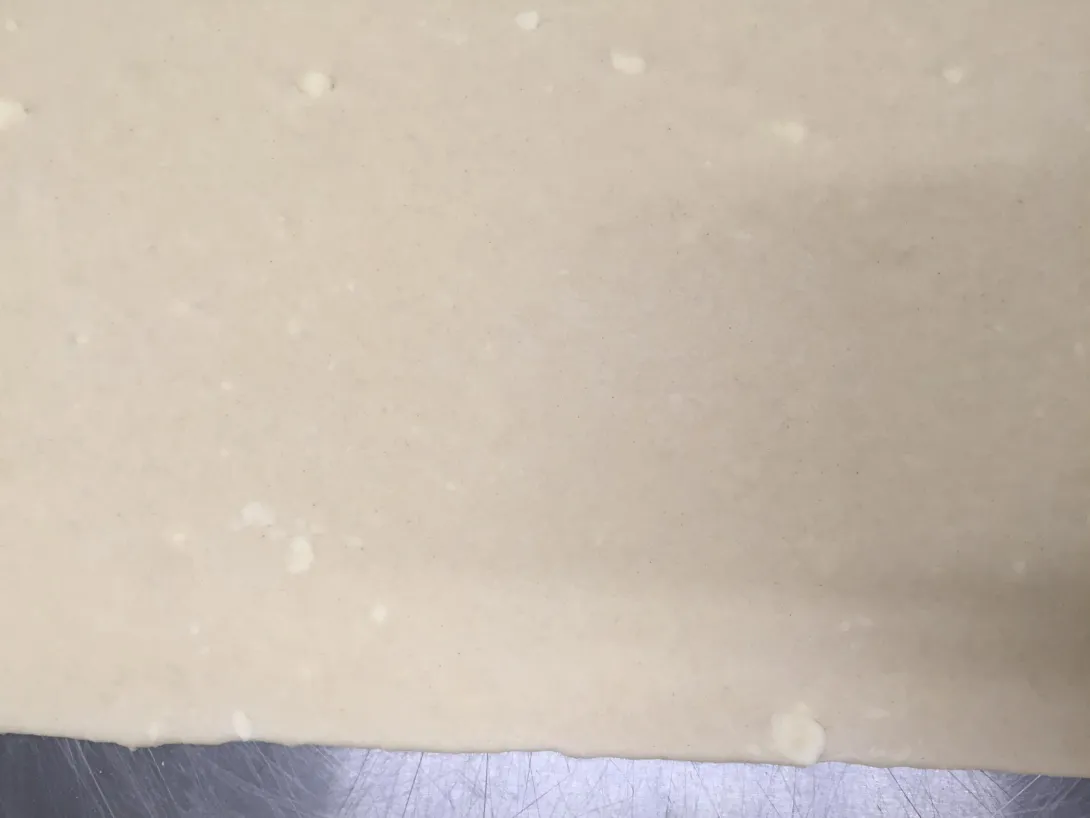
Hello!
I have been making croissant for my local green market for the last few weeks.
I am having trouble with the 2nd and 3rd folding, the butter cracks or breaks and does not roll out smoothly. The butter rolls out nice in the first fold, I let it rest for about 30 minutes then with the next fold it cracks.
The croissants are not coming out flaky, they are more dense.
Any tips or advice would be appreciated! :)
An
Normally cracks mean that either your dough or your butter is too cold (usually the butter). It is extremely important that the butter be THE SAME CONSISTENCY (or slightly softer, though that depends on the weather) as the dough at the moment of incorporation. If the butter is colder, it will harden more quickly than the dough during the rests in the fridge/freezer and thus more likely to tear it.
However, it seems like in your pictures the butter is not necessarily tearing the dough, but that the dough is tearing on its own and revealing the butter. Be very careful when you are rolling out the dough with the butter . . . the principle is that the butter needs to roll out IN PARALLEL with the dough, while it looks like its smearing through. What kind of butter are you using and how are you preparing it?
When I am incorporating the butter with the dough during the first folding, the butter and dough are the same temperature and consistency. The butter rolls out great during the first fold. The problem is the 2nd and 3rd time when it cracks.
I am using butter from GFS, a local wholesale foodservice store. They don't have the butterfat % on the package but I don't think it is the highest quality. I am mixing 2Tbsp of flour for every 280g butter for the laminating. (that is what we did at a french bakery i worked at)
Thanks
OK -- so let's say all your ingredients are OK. Let's then take a look at your technique.
So you position your butter in the middle of your dough, envelope it nicely within, and then roll it out to a certain length. After this rolling out, what kind of fold are you doing (tour simple or tour double) ? Are you then letting it rest immediately after folding it ? And where are you letting it rest and for how long ?
I am doing a letter style fold and letting it rest for 30 minutes. I roll it out to about 24" long , 8" wide.
I am locking the butter in like this :
https://crackingcrust.files.wordpress.com/2015/08/20150720_181435.jpg
What does your basic dough recipe look like ? It could be also that the gluten in the dough is not tough enough to hold up to the long roll-outs.
In bakery training, the basic dough ("détrempe") is made the day before butter incorporation, divided and left to ferment in the fridge overnight. We would then take the pieces of dough ("paton") and envelop a slab of butter ("beurre de tourage" -- a special kind of butter made especially to be pliable), similar to how you do it.
What I also notice is that you are using cut pieces of butter to do the incorporation with . . . I'm wondering if that prevents it from spreading uniformly, which could also cause it to poke through. You want to try to work with a single piece of butter rather than a lot of little pieces. Flour is a good ingredient to add to increase the pliability of the butter, but you should incorporate your flour, chill the butter/flour mixture, and then beat the COLD butter into the necessary shape to incorporate into the croissant dough. You should see how French bakers beat the living crap out of their butter. Basically, you take a rolling pin and go to town on the poor butter until it gets to the shape you want it. The thickness of the butter should be (approximately) equal to both the thickness of the dough below and the dough above it.
Once you've enveloped the butter, give it a good tapping to spread it out in the dough (not too hard, don't want to shatter the butter). Then roll it out, give it a fold, send it to the fridge for 15-30 minutes, roll and fold, fridge for 15-30, roll and fold, fridge for 15-30, then final roll-out and cut into portions. You could skip one of the roll and folds if you do a double fold as a first fold. You'll have a little less layering, but it'll still be good.